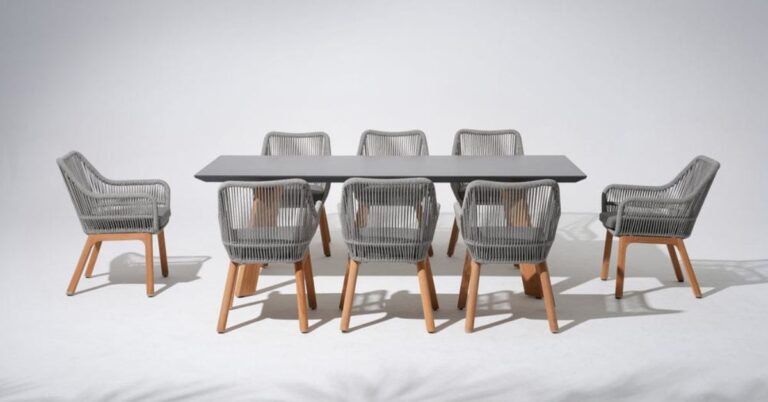When investing in an outdoor dining set, durability and weather resistance are key factors to consider. The right materials ensure your furniture withstands harsh sunlight, rain, wind, and even snow while maintaining its aesthetic appeal.
In this guide, we’ll explore the best weatherproof materials for modern outdoor dining sets, helping you choose the perfect option for your patio, deck, or garden.
Why Material Choice Matters for Outdoor Dining Sets
Outdoor furniture faces constant exposure to:
- UV rays (causing fading and brittleness)
- Moisture (leading to rust, mold, and rot)
- Temperature fluctuations (resulting in warping and cracking)
Choosing the right material ensures longevity, minimal maintenance, and year-round comfort.
Top Weatherproof Materials for Outdoor Dining Sets
- Powder-Coated Aluminum – Lightweight & Rust-Proof
Best for: Coastal areas, rainy climates, modern aesthetics
Pros:
- Extremely lightweight yet sturdy
- Rust-proof and corrosion-resistant
- Powder coating adds extra durability and color options
- Low maintenance (just occasional cleaning)
Cons:
- Can feel less sturdy in windy conditions (unless weighted)
- Higher-end models can be expensive
Maintenance Tips:
- Wipe down with mild soap and water
- Check for scratches to prevent corrosion (rare with powder coating)
- Teak – Naturally Weather-Resistant & Timeless
Best for: Classic, high-end outdoor spaces
Pros:
- Naturally resistant to rot, insects, and moisture
- Develops a beautiful silvery patina over time
- Extremely durable (lasts decades with proper care)
- Heavy and stable in windy conditions
Cons:
- Expensive compared to synthetic options
- Requires occasional oiling to maintain golden color (optional)
Maintenance Tips:
- Clean with teak cleaner annually
- Apply teak oil if you prefer the original honey tone
- Synthetic Wicker (PE Rattan) – Stylish & All-Weather
Best for: Contemporary and cozy outdoor settings
Pros:
- UV-resistant polyethylene (PE) wicker won’t fade or crack
- Lightweight yet sturdy when paired with aluminum frames
- Resistant to mold and mildew
- Available in various colors and weaves
Cons:
- Not as durable as metal or teak in extreme weather
- Cushions may need storage during heavy rain
Maintenance Tips:
- Hose down to remove dust
- Store cushions in bad weather
- Stainless Steel – Sleek & Ultra-Durable
Best for: Modern, high-end outdoor dining spaces
Pros:
- Highly resistant to rust and corrosion (marine-grade is best)
- Strong and stable, even in windy areas
- Sleek, contemporary look
Cons:
- Can get very hot in direct sunlight
- Higher cost than aluminum
Maintenance Tips:
- Wipe with a stainless steel cleaner to prevent fingerprints
- Avoid abrasive cleaners to prevent scratches
- Polywood (Recycled Plastic Lumber) – Eco-Friendly & Tough
Best for: Sustainable, low-maintenance outdoor furniture
Pros:
- Made from recycled plastic, eco-friendly
- Won’t rot, splinter, or fade
- Resistant to saltwater, making it great for coastal homes
- Available in wood-like finishes
Cons:
- Heavier than aluminum
- Limited design flexibility compared to wicker or metal
Maintenance Tips:
- Simply wash with soap and water
- No sealing or painting required
- Concrete – Industrial & Ultra-Sturdy
Best for: Modern, minimalist outdoor dining spaces
Pros:
- Extremely durable and weatherproof
- Heavy, so it won’t tip over in wind
- Unique, high-end aesthetic
Cons:
- Very heavy (hard to move)
- Can crack in extreme freeze-thaw cycles
Maintenance Tips:
- Seal to prevent staining
- Cover in winter if in freezing climates
How to Choose the Best Material for Your Outdoor Dining Set
Consider these factors when selecting your outdoor dining furniture by Jardina Outdoor Furniture:
- Climate Considerations
- Humid/Rainy Areas: Teak, aluminum, or polywood (resistant to mold and rot)
- Coastal Regions: Powder-coated aluminum or stainless steel (rust-proof)
- Hot & Sunny Climates: Synthetic wicker or polywood (UV-resistant)
- Freezing Winters: Avoid concrete unless sealed properly
- Maintenance Level
- Low Maintenance: Aluminum, polywood, synthetic wicker
- Moderate Maintenance: Teak (optional oiling), stainless steel (occasional cleaning)
- High Maintenance: Unsealed wood, wrought iron (requires repainting)
- Style & Aesthetic
- Modern: Aluminum, stainless steel, concrete
- Traditional/Rustic: Teak, polywood with wood-like finish
- Bohemian/Cozy: Synthetic wicker with cushions
- Budget
- Affordable: Resin chairs, basic aluminum sets
- Mid-Range: Synthetic wicker, powder-coated aluminum
- High-End: Teak, stainless steel, custom concrete
Extending the Life of Your Outdoor Dining Set
Even the most durable materials benefit from proper care:
- Use protective covers during extreme weather
- Store cushions when not in use
- Clean regularly to prevent dirt buildup
- Apply sealants (for wood and concrete) as needed
Final Thoughts: Which Material is Best for You?
The best material for your outdoor dining set depends on your climate, style, and maintenance preferences. Here’s a quick recap:
- Best Overall: Powder-coated aluminum (durable, lightweight, rust-proof)
- Most Elegant: Teak (natural beauty, long-lasting)
- Most Modern: Stainless steel or concrete (sleek, industrial)
- Most Eco-Friendly: Polywood (recycled, low-maintenance)
- Most Comfortable: Synthetic wicker (cozy, stylish)
By choosing the right material, your outdoor dining set will remain beautiful and functional for years to come.
Ready to Upgrade Your Outdoor Space?
Explore high-quality, weather-resistant modern outdoor dining sets that combine durability and style. Whether you prefer sleek metal, warm teak, or eco-friendly polywood, the perfect set is out there for your backyard oasis.
Which material suits your outdoor dining needs? Share your thoughts in the comments!

